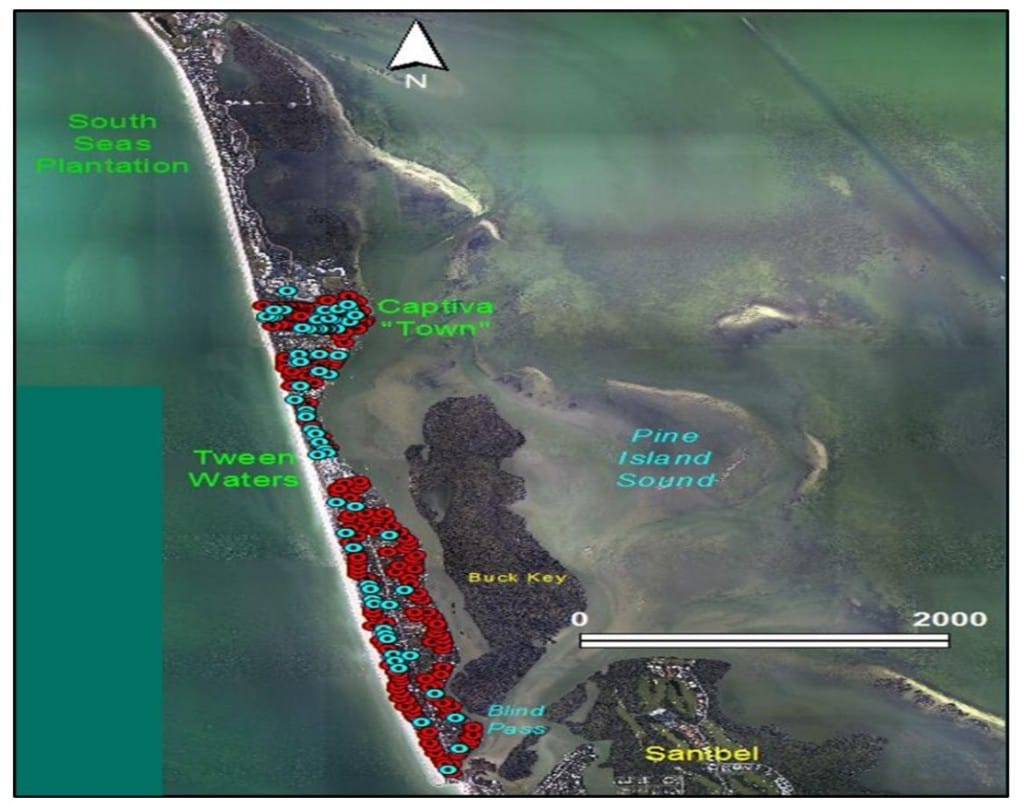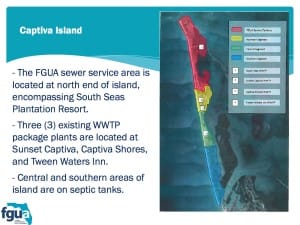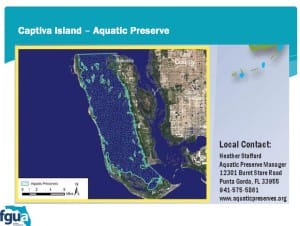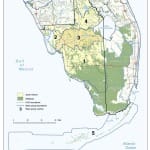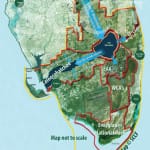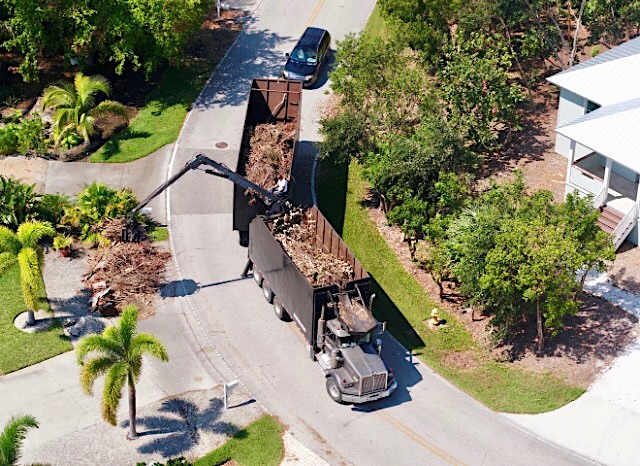
Followup On Captiva Sewer Issue On Sanibel City Council Agenda March 1.
Captiva Community Panel In Early Stages Of Exploring A Central Sewer System.
Preliminary Estimates: Central Sewer System Would Cost $15M or $23,500 per unit.
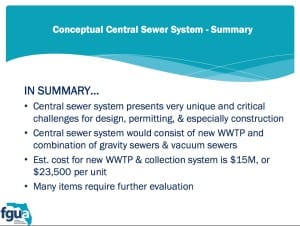
Captiva Island Conceptual Central Sewer System – Summary, Florida Government Utility Authority, December 2015.
Discussions about local water quality and the impact of septic systems continue for Sanibel and Captiva Islands.
Water quality and the impact of septic systems on Captiva have been a significant focus of recent Captiva Community Panel meetings, and are referenced in current drafts of the Captiva Plan Update:
POLICY 13.1.5: Quality of adjacent waters. Lee County will encourage and support efforts by the Captiva community to investigate and recommend measures that will improve water quality in Pine Island Sound and the Gulf of Mexico adjacent to Captiva Island. Such measures may include regulation of septic systems and sewers only if sized to limit development to that permitted by this plan. Full document here.
The Florida Government Utility Authority delivered a presentation to the Captiva Community Panel on December 8, 2015 that included a preliminary estimate of $15M to build a Captiva Island Central Sewer System, or $23,500 per unit.
The Sanibel City Council has the Captiva sewer issue back on its agenda for the March 1 meeting, including an update on the pending permit for a South Seas Water Treatment Plant.
The March 1st Sanibel City Council agenda item follows-up on a January 5th background report on Captiva 2015 Wastewater Treatment Plant and Septic Records submitted by Judy Zimomra, Sanibel City Manager.
“Background
Recently, City staff compiled the 2015 records for septic systems and wastewater treatment plants for the 33924 zip code (Captiva and North Captiva). Pursuant to Florida statutes, properties that generate commercial sewage at a rate of 5,000 gallons or more per day and domestic properties that generate more than 10,000 gallons of wastewater per day and do not have access to centralized sanitary sewer systems are required to install wastewater treatment plants.
WWTPs are regulated by the Department of Environmental Protection (DEP). The DEP also has the authority to grant exceptions to this guideline. Properties generating less than these flows are required to install septic systems that are regulated by the Department of Health.
Wastewater Treatment Plants (WWTP)
Currently, according to the Department of Environmental Protection in the 33924 zip code, there are four wastewater treatment plants:
- Captiva Shores Condominium Association
- South Seas Plantation
- Tween Waters Inn
- Sunset Captiva
Based on Florida Statutes, Chapter 403, the DEP is responsible for the oversight of adequate collection, treatment, disposal and reuse by Florida’s domestic and industrial wastewater facilities and promotes sound waste management practices, ensures appropriate and timely cleanup of environmental contamination. Additionally, State of Florida, Department of Environmental Protection, Chapter 62-620, Florida Administrative Codes provides the following standards for wastewater facilities:
- Wastewater facilities’ Discharge Monitoring Reports (DMR) are submitted at the frequency specified in the facility permit. Typically, DMR submission is monthly; however, some facilities may also be required to submit quarterly, semi-annually, or annually.
- Permittees are required to report to the Department any noncompliance which may endanger health or the environment. Information is to be provided orally within 24 hours from the time the permittee becomes aware of the circumstances. A written submission is also to be provided within five days of the time the permittee becomes aware of the circumstances.
- Typically, permits are required to be renewed every five years; however, if a plant qualifies, there is a formula that can be applied to extend the permit renewal period to every ten years.
Septic Systems
Currently, according to the Department of Health (DOH), there are 171 known confirmed septic systems and an estimated 355 likely septic systems for a total of 526 estimated septic systems in the 33924 zip code. The DOH database is post 1998 and does not include systems installed prior to 1998. The DOH database tracks new septic permits issued. Please note, the DOH does not remove retired septic systems from their database.
Based on Florida Statutes, Chapter 381, the DOH performs septic system application reviews and site evaluations, issue permits, and conducts inspections and complaint investigations associated with the construction, installation, maintenance, modification, abandonment, operation, use, or repair of an onsite sewage treatment and disposal systems. Additionally, State of Florida, Department of Health, Chapter 64E-6, Florida Administrative Codes provides the following standards for onsite sewage treatment and disposal systems:
- Conventional systems that only receive residential type waste are not required to be inspected on a regular basis.
- Each aerobic unit (advanced systems) is to be inspected by an approved maintenance entity at least two times each year.
- Aerobic treatment units serving commercial establishments are inspected four times per year (maintenance entity is to furnish the DOH county health department a listing of all aerobic units inspected or serviced during the respective reporting period).
- The DOH county health department, at least annually, inspects the maintenance and performance of aerobic treatment units. Additionally, the DOH county health department also inspects each authorized maintenance entity, including review of their service records and maintenance agreements.
As this is written, additional 2015 records are continuing to be submitted from both DOH and DEP for this calendar year.”
For more information and all 2015 Department of Environmental Protection Sewer & Septic Records, please see Captiva Island – 33924.

